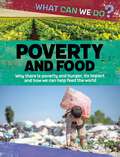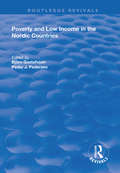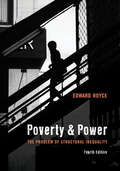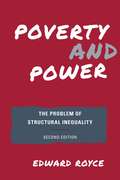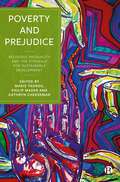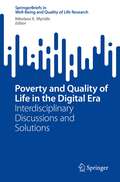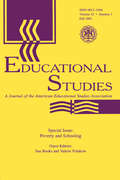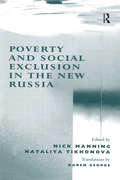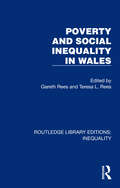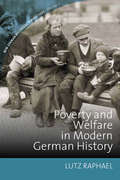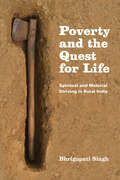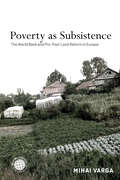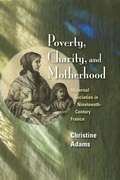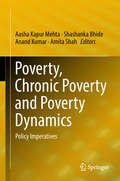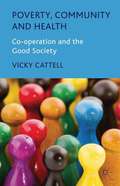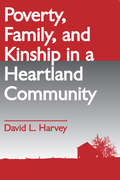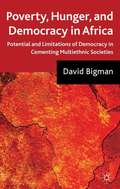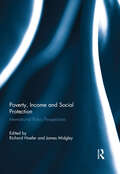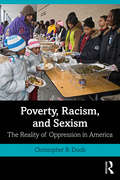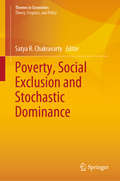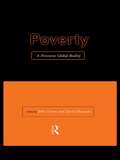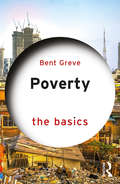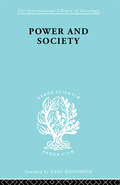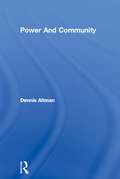- Table View
- List View
Poverty and Food: Why There Is Poverty And Hunger, Its Impact And How We Can Help Feed The World (What Can We Do? #2)
by Katie DickerA look at two of the biggest challenges facing our world today - poverty and food insecurity - and how we are tackling themPoverty and hunger are inextricably linked and are present in virtually every country in the world today. We have enough food to feed the world's 8 billion people but good, nutritious food is often unaffordable or inaccessible to the world's most vulnerable, while too much food is wasted by the world's higher-income countries. At the same time, climate change and conflict are complicating the global picture. What can we do to help those most in need? How can we build a better, fairer, more equal, cleaner world? This series seeks to answer this by exploring some of the greatest challenges facing our planet today - from disease to conflict, and from the energy crisis to the plight of refugees. It explains what is already being done to meet and tackle these challenges, and explores what more could and should be done, both individually and collectively, to ensure a better future for our planet, its people and its wildlife.Taking a positive, but realistic perspective, this series aims to empower young readers by helping them understand these complex and troubling issues, calm their anxieties, and promote empathy and understanding for the many millions of people suffering from for example, poverty or inequality.Perfect for readers aged 9 and upTitles in the series:Climate ChangeDiseaseInequalityMigrationPoverty & Food InsecurityWar & Conflict
Poverty and Low Income in the Nordic Countries (Routledge Revivals)
by Björn Gustafsson Peder J. PedersenThis title was first published in 2000: The Nordic Council and the Nordic Council of Ministers decided in 1994 to initiate and finance a comparative study to understand better the structure and development of poverty in five Nordic countries, (Denmark, Finland, Iceland, Norway and Sweden). The main question posed is how the number of people living with low incomes has changed over time and what characterizes such households.? Since no official poverty line has been defined in the Nordic countries, the comparative study examines a set of different definitions of poverty and analyzes the change in poverty rates and poverty composition in light of those different definitions.
Poverty and Power: The Problem of Structural Inequality
by Edward Royce Rollins CollegePoverty is a serious problem in the United States, more so than commonly imagined, and more so than in other industrialized nations. Most Americans adhere to an individualistic perspective: they believe poverty is largely the result of people being deficient in intelligence, determination, education, and other personal traits. Poverty and Power, Fourth Edition challenges this viewpoint, arguing that poverty arises from the workings of four key structural systems—the economic, the political, the cultural, and the social—and ten obstacles to economic justice, including unaffordable housing, inaccessible health care, and racial and gender discrimination. The author argues that a renewed war on poverty can be successful, but only through a popular movement to bring about significant change in the workings of American economic, political, and cultural institutions.
Poverty and Power: The Problem of Structural Inequality (2nd Edition)
by Edward Royce<p>Poverty and Power asserts that American poverty is a structural problem resulting from failings in our social system rather than individual failings of the poor. Contrary to the popular belief that poverty results from individual deficiencies, author Edward Royce introduces students to the very real structural issues that stack the balance of power in the United States. The book introduces four systems that contribute to inequality in the U.S.--economic, political, cultural, and structural--then discusses ten institutional problems that make life difficult for the poor and contribute to the persistence of poverty. <p>Throughout the book, the author compares individualistic and structural approaches to poverty to assess strengths and limitations of each view. The second edition has been revised throughout with new statistical information, as well as analysis of the recent recession, the Obama presidency, increasing political polarization, the rise of the Tea Party and appearance of the Occupy Movement, new anti-poverty movements, and more.</p>
Poverty and Prejudice: Religious Inequality and the Struggle for Sustainable Development
by Mariz Tadros, Philip Mader and Kathryn CheesemanEPDF and EPUB available Open Access under CC-BY-NC-ND licence. Freedom of religion and belief is crucial to any sustainable development process, yet the Sustainable Development Goals (SDGs) pay little attention to religious inequalities. This book offers a comprehensive overview of how efforts to achieve SDGs can be enhanced by paying greater attention to freedom of religion and belief. In particular, it illustrates how poverty is often a direct result of religious prejudice and how religious identity can shape a person’s job prospects, their children’s education and the quality of public services they receive. Drawing on evidence from Asia, the Middle East and sub-Saharan Africa, the book foregrounds the lived experiences of marginalized communities as well as researchers and non-state actors.
Poverty and Quality of Life in the Digital Era: Interdisciplinary Discussions and Solutions (SpringerBriefs in Well-Being and Quality of Life Research)
by Nikolaos E. MyridisThis book proposes new solutions to the problem of poverty, and begins with providing analyses. It bases most of the analyses and solutions in the context of the digital era. The book also follows, in addition to a scientific distribution, a spatial-geographical one: analyses of countries of the European Union as well as South Africa, while it referring to two main variables, television and art, as agents of poverty alleviation. The book places particular focus on how poverty is understood in the framework of Industry 4.0. It introduces a new expanded Multidimensional Poverty Index with more than 20 dimensions; moreover, it provides a mathematically based solution for the disposal of perishable food. Finally, it does not disregard the crucial aspect of the issue of poverty: that of education planning. This book is of interest to specialists in poverty research, from students to professionals and from professors to activists, without excluding engineers.
Poverty and Schooling: A Special Issue of Educational Studies
by Valerie Polakow Sue BooksFirst published in 2001. Routledge is an imprint of Taylor & Francis, an informa company.
Poverty and Social Exclusion in the New Russia
by Nataliya TikhonovaPresenting the findings of a major research project funded by the EU (INTAS), this key volume investigates the regional, ethnic and socio-cultural aspects of poverty and social exclusion in Russia in recent years. In-depth household interviews and survey data allowed teams from the UK, Denmark and Russia to compare different societies and communities in Russia across several different themes: the definition of poverty in different regional, ethnic and socio-cultural settings; the reproduction and formation of poverty subcultures in different societies and communities; the ethnic/national and political values of poor people; the readiness of poor people for social protest; and a comparison of Russia with other EU countries. Offering a wealth of original data collected following a period of rapid impoverishment of the Russian population, the study considers the challenge this presents to Western European models of poverty and social exclusion.
Poverty and Social Inequality in Wales (Routledge Library Editions: Inequality #7)
by Gareth Rees Teresa L. ReesOriginally published in 1980, this book presents a detailed empirical analysis of the key dimensions of inequality and poverty in Wales, discussing such aspects as the distribution of income and wealth, the housing situation, the functioning of the NHS and urban deprivation. Wales emerges as a country severely disadvantaged in relation to much of the rest of Britain. Moreover, the extent of inequalities within Wales is also striking. In the second part of the book each contributor applies a particular theoretical perspective to an aspect of the situation discussed in the first part. The perspectives adopted are diverse, ranging from Keynesianism, through dual labour markets to dependency theory and Marxist analysis. Each essay emphasises the importance of locating our understanding of poverty and social inequality in the context of the patterns of economic development in Wales and in the functioning of the State apparatus.
Poverty and Welfare in Modern German History (New German Historical Perspectives #7)
by Lutz RaphaelFor many, the history of German social policy is defined primarily by that nation’s postwar emergence as a model of the European welfare state. As this comprehensive volume demonstrates, however, the question of how to care for the poor has had significant implications for German history throughout the modern era. Here, eight leading historians provide essential case studies and syntheses of current research into German welfare, from the Holy Roman Empire to the present day. Along the way, they trace the parallel historical dynamics that have continued to shape German society, including religious diversity, political exclusion and inclusion, and concepts of race and gender.
Poverty and the Quest for Life: Spiritual and Material Striving in Rural India
by Bhrigupati SinghThe Indian subdistrict of Shahabad, located in the dwindling forests of the southeastern tip of Rajasthan, is an area of extreme poverty. Beset by droughts and food shortages in recent years, it is the home of the Sahariyas, former bonded laborers, officially classified as Rajasthan’s only "primitive tribe. ” From afar, we might consider this the bleakest of the bleak, but in Poverty and the Quest for Life, Bhrigupati Singh asks us to reconsider just what quality of life means. He shows how the Sahariyas conceive of aspiration, advancement, and vitality in both material and spiritual terms, and how such bridging can engender new possibilities of life. Singh organizes his study around two themes: power and ethics, through which he explores a complex terrain of material and spiritual forces. Authority remains contested, whether in divine or human forms; the state is both despised and desired; high and low castes negotiate new ways of living together, in conflict but also cooperation; new gods move across rival social groups; animals and plants leave their tracks on human subjectivity and religiosity; and the potential for vitality persists even as natural resources steadily disappear. Studying this milieu, Singh offers new ways of thinking beyond the religion-secularism and nature-culture dichotomies, juxtaposing questions about quality of life with political theologies of sovereignty, neighborliness, and ethics, in the process painting a rich portrait of perseverance and fragility in contemporary rural India.
Poverty and the Quest for Life: Spiritual and Material Striving in Rural India
by Bhrigupati SinghThe Indian subdistrict of Shahabad, located in the dwindling forests of the southeastern tip of Rajasthan, is an area of extreme poverty. Beset by droughts and food shortages in recent years, it is the home of the Sahariyas, former bonded laborers, officially classified as Rajasthan’s only “primitive tribe.” From afar, we might consider this the bleakest of the bleak, but in Poverty and the Quest for Life, Bhrigupati Singh asks us to reconsider just what quality of life means. He shows how the Sahariyas conceive of aspiration, advancement, and vitality in both material and spiritual terms, and how such bridging can engender new possibilities of life. Singh organizes his study around two themes: power and ethics, through which he explores a complex terrain of material and spiritual forces. Authority remains contested, whether in divine or human forms; the state is both despised and desired; high and low castes negotiate new ways of living together, in conflict but also cooperation; new gods move across rival social groups; animals and plants leave their tracks on human subjectivity and religiosity; and the potential for vitality persists even as natural resources steadily disappear. Studying this milieu, Singh offers new ways of thinking beyond the religion-secularism and nature-culture dichotomies, juxtaposing questions about quality of life with political theologies of sovereignty, neighborliness, and ethics, in the process painting a rich portrait of perseverance and fragility in contemporary rural India.
Poverty as Subsistence: The World Bank and Pro-Poor Land Reform in Eurasia (Emerging Frontiers in the Global Economy)
by Mihai VargaPoverty as Subsistence explores the 'propertizing' land reform policy that the World Bank advocated throughout the transitioning countries of Eurasia, expecting poverty reduction to result from distributing property titles over agricultural land to local (rural) populations. China's early 1980s land reform offered support for this expectation, but while the spread of propertizing reform to post-communist Eurasia created numerous "subsistence" smallholders, it failed to stimulate entrepreneurship or market-based production among the rural poor. Varga argues that the World Bank advocated a simplified version of China's land reform that ignored a key element of successful reforms: the smallholders' immediate environment, the structure of actors and institutions determining whether smallholders survive and grow in their communities. With concrete insights from analysis of the land reform program throughout post-communist Eurasia and multisited fieldwork in Romania and Ukraine, this book details how and why land reform led to subsistence and the mechanisms underpinning informal commercialization.
Poverty, Charity, and Motherhood: Maternal Societies in Nineteenth-Century France
by Christine AdamsThis far-reaching study of maternal societies in post-revolutionary France focuses on the philanthropic work of the Society for Maternal Charity, the most prominent organization of its kind. Administered by middle-class and elite women and financed by powerful families and the government, the Society offered support to poor mothers, helping them to nurse and encouraging them not to abandon their children. In Poverty, Charity, and Motherhood, Christine Adams traces the Society's key role in shaping notions of maternity and in shifting the care of poor families from the hands of charitable volunteers with religious-tinged social visions to paid welfare workers with secular goals such as population growth and patriotism. Adams plumbs the origin and ideology of the Society and its branches, showing how elite women in Paris, Lyon, Bordeaux, Rouen, Marseille, Dijon, and Limoges tried to influence the maternal behavior of women and families with lesser financial means and social status. A deft analysis of the philosophy and goals of the Society details the members' own notions of good mothering, family solidarity, and legitimate marriages that structured official, elite, and popular attitudes concerning gender and poverty in France. These personal attitudes, Adams argues, greatly influenced public policy and shaped the country's burgeoning social welfare system.
Poverty, Chronic Poverty and Poverty Dynamics: Policy Imperatives
by Anand Kumar Amita Shah Aasha Kapur Mehta Shashanka BhideThis book discusses critical policy issues that need to be addressed if India wishes to achieve the SDG 1 based elusive goal of ending poverty in the country. In its nine chapters, it takes the readers through trends and estimates of poverty in India, explains changes in the way it has been measured over time and the factors that lead to persistence of poverty, draws attention to the fact that hunger is both a cause and an effect of poverty and has gender and age dimensions too. The book revisits strategies that were successful in addressing poverty emanating from situations of conflict, presents a discussion on migration as a critical coping mechanism among poor, analyses the links between ill health and poverty as well as education and poverty to draw attention to the policy imperatives that need attention.India’s report card on poverty remains dismal even though there is recognition of the importance of reducing or eliminating or ending it at both national and global levels. Despite rapid economic growth and improvement on a range of development indicators, an unacceptably high proportion of India’s population continues to suffer poverty in multiple dimensions. SDG 1 or “ending poverty in all its forms everywhere” cannot be achieved unless policies and poverty alleviation programmes understand and address chronic poverty and its dynamics. This requires that we estimate and understand the extent of poverty, the factors that lead to people getting stuck in it and the ways this can be addressed. It also requires understanding the dynamic nature of poverty or the fact that many of those who are poor are able to move out of poverty as well as the fact that many others who are not poor become impoverished. These are the issues that are comprehensively examined and addressed in this book.In addition to students, teachers and researchers in the areas of development, economic growth, equity and welfare, the book is also of great interest to policy makers, planners and non‐government agencies who are concerned with understanding and addressing poverty-related issues in the developing countries.
Poverty, Community and Health
by Vicky CattellDespite plentiful evidence on poverty and reduced health chances and on the benefits of co-operative social networks and social capital, the nature of the relationship between them remains uncertain. Yet an enhanced understanding is needed if we are to gain, not only a more effective purchase on social processes involved in well-being, or on links between poverty and place, but also of the stratagems people adopt to challenge or cope with social and economic difficulties and resist their deleterious effects. Drawing on key concepts and on community studies conducted in East London housing estates, this book brings together diverse strands of influence on participatory community life and individual well-being. Residents' rich narratives are used to emphasize the significance of different social network patterns for mediating disadvantage and happiness. The book makes a timely contribution to post 2010 policy agendas and to current political debates on the 'big society' and the 'good society'.
Poverty, Family, and Kinship in a Heartland Community: Poverty, Family, And Kinship In A Heartland Community
by David L. HarveyWith a few notable exceptions, sociological studies of poor, native-born, non-ethnic whites in rural areas are rare. This book corrects this oversight with an ethnographic study of a small, poor, white, heartland community that the author calls "Potter Addition." The community consists of some 100 families and is located on the rural-urban fringe of a medium-sized Midwestern city.Poverty, Family, and Kinship in a Heartland Community is the story of three generations of rural families who, one after another, have been driven from the land during the last seventy-five years. Harvey argues against the grain of a number of recent studies that "Potter Addition's" poverty, like much modern poverty, has its origins in the productive contradictions of late capitalism. It is not the result of some moral or motivational defect of the poor themselves. At the same time he shows, even as they struggle to survive their uncertain niche and learn how to adapt, these families play an active role in reproducing the everyday material and cultural details of their poverty from the substance of their daily experiences.Working from this premise, Harvey provides a detailed ethnographic description of "Potter Addition" and its people. The volume focuses especially on the family and kinship structures that have developed in "Potter Addition" and shows how they fit into the overall response of the poor to their uncertain and unpredictable class situation. This is a unique effort by a knowledgeable researcher who, in this work, boldly steps outside conventional realms of discourse in sociology and geography.
Poverty, Hunger, and Democracy in Africa
by David BigmanThe book evaluates alternative policy options for the African countries to overcome the food crisis and the changing structure of world trade to sustain their impressive growth of the early 2000s. These policies must go beyond economic reforms and seek a solution to the entrenched political problems that divided the continent.
Poverty, Income and Social Protection: International Policy Perspectives
by James Midgley Richard HoeferThis book provides insights into the way social protection policy is being redefined as a result of the new commitment by governments around the world to use these programs to reduce poverty. The case studies presented show how innovations in social protection have emerged in different countries. They also discuss various aspects of social protection that will be of interest to readers. While some of the case studies are primarily descriptive and seek to document recent trends in different countries, they also address important social policy issues. Others are particularly topical because they provide useful updates on recent social protection innovations. Countries discussed include Brazil, Britain, Chile, China, Indonesia, South Africa, and the United States. This book was originally published as a special issue of the Journal of Policy Practice.
Poverty, Racism, and Sexism: The Reality of Oppression in America
by Christopher B. DoobExploring the structural causes and consequences of inequalities based on a person’s race, class, and gender, Poverty, Racism and Sexism: The Reality of Oppression in America concentrates on this formidable set of disadvantages, demonstrating how Americans are adversely affected by just one or a combination of three social factors. Grounded in sociological thought, the text highlights unfolding stories about major social inequalities and relentless campaigns for people’s rights. Weaving together such concepts as individualism, social reproduction, social class, and intersectionality, the book provides a framework for readers to understand the vast injustices these groups encounter, where and why they originated, and why they continue to endure. Poverty, Racism and Sexism is a compact, versatile volume which will prove an invaluable resource for those studying social inequality, social problems, social stratification, contemporary American society, social change, urban sociology, and poverty and inequality.
Poverty, Social Exclusion and Stochastic Dominance (Themes in Economics)
by Satya R. ChakravartyThis book honors the memory of Tony Atkinson, who made significant contributions to the rigorous study of income inequality, poverty, and redistribution. These essays presented, covering a span of over 30 years of research and scholarship, have been at the forefront of distributional analysis, and many of them are of prime importance for contemporary developments in the real-valued measurement of poverty and inequality, with particular reference to the concepts of fuzzy poverty assessment, vulnerability, heterogeneity/multidimensionality, unit consistency, sub-group decomposability, and dominance criteria. While all of these articles have been previously published—singly or with co-authorship—in a number of professional journals or distinguished edited volumes, this book is greatly enriched by a substantial introductions by the authors, which place the contributions in context, highlights their inter-connectedness, and relates them to the work of Tony Atkinson and other scholars. This book is of intrinsic value to welfare analysts, as well as being a tribute to a very great scholar by a fellow economist.
Poverty: A Persistent Global Reality
by John Dixon Professor John Dixon David MacarovThis book addresses the long-standing global issue of poverty. An introductory chapter explores concepts and definitions of poverty, the subsequent chapters providing detailed examinations of poverty in ten different countries: UK, USA, Australia, Canada, Hong Kong, Ireland, Malta, The Netherlands, The Philippines and Zimbabwe. Each chapter follows a consistent format, to facilitate comparison and focuses on the following issues:- * the socio-economic and historical context within which poverty exists * the extent and nature of poverty its causes * the measures that have been taken to mitigate it. This book will be essential reading for students of social policy and administration as well as development studies and anthropology.
Poverty: The Basics (The Basics)
by Bent GrevePoverty has dire consequences on the ability to fulfil one’s aspirations for life. Poverty has strong implications for social cohesion and societies’ abilities to function in harmonious ways. This book presents the readers with the core concepts, latest development and knowledge about policies that work to eliminate absolute poverty. This volume shows what the consequences are for the quality of life of those living in poverty. It describes life for people in poverty in general, but also deals more specifically with children, in-work poverty and the elderly, thus providing a life, generational and global perspective on poverty, including the impact on people’s happiness levels. The book also discusses policies aimed at poverty reduction, such as changes to the labour market – including the risk of working poor – and shows that there is a variety of possible instruments available to reduce poverty. These range from direct provision of social security to ensuring education and a better functioning labour market. Written in an engaging and accessible style, the book provides a succinct insight into the concept of poverty, how to measure it, the situation of poverty around the globe as well as different types of possible interventions to cope with poverty. Supporting theory with examples and case studies from a variety of contexts, suggestions for further reading, and a detailed glossary, this text is an essential read for anyone approaching the study of poverty for the first time.
Power & Society Ils 50: A Framework For Political Inquiry (International Library of Sociology #No. 2)
by Harold D. Lasswell Abraham KaplanFirst published in 1998. Routledge is an imprint of Taylor & Francis, an informa company.
Power And Community: Organizational And Cultural Responses To Aids
by Dennis AltmanThis book provides a global overview of the role of the community sector, examining in detail the origins and activities of community organizations in Europe, the Americas, Africa, South Asia, Southeast Asia, Australia and the Pacific. It also describes the impact of sexuality and gender on AIDS activism and AIDS organizing, as well as broader cultural responses to the epidemic. It charts the emergence and development of the community sector response to HIV and AIDS, illustrating the factors that led affected individuals and communities to organize, question, challenge and redefine initial governmental responses to the epidemic. It describes the contribution of the community / NGO sector to global efforts to prevent the spread of the disease, highlighting tensions which have sometimes arisen within community based organizations themselves: tensions between activism and service provision, between altruism and self help, between volunteer participation and management control, and between fluidity of function and increasing bureaucratization. "Power and Community" has grown out of the author's intellectual and political commitment to the idea that without support from strong community based responses, public health systems will fail to deal with the crisis of AIDS. Dennis Altman analyzes the practical dilemmas which have confronted community based organizations around the world, and the political significance of their ability to motivate and mobilize affected communities. The result is a book which should be a valuable resource for researchers, community organizations, policy makers and activists alike.
